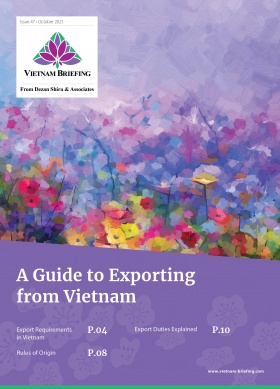Why Vietnam is Forecast to be the Fastest Growing Internet Economy in Southeast Asia
- Vietnam is expected to be one of the fastest-growing internet economies in the next 10 years as per the e-Conomy SEA 2021 report by Google.
- Vietnam’s digital market is thriving thanks to strong growth in e-commerce, fintech, and education technology.
- Vietnam’s Briefing highlights the strong potential of the digital economy supposed by government schemes and incentives.
Vietnam is projected to be the fastest-growing internet economy in Southeast Asia in the next 10 years according to the e-Conomy SEA 2021 report by Google, Temasek, and Bain, Southeast Asia’s Internet economy research program. It also predicts that by 2025, the country’s overall internet economy will likely reach US$57 billion in value with a compound annual growth rate (CAGR) of 29 percent.
By 2030, Vietnam’s internet economy is expected to rank second in Southeast Asia, reaching US$220 billion in gross merchandise value (GMV).
Despite a 45 percent decrease in GMV of online travel in 2020-21, it is expected that the sector will record an increase of 44 percent by 2025. Meanwhile, e-commerce, transport and food, and online media witnessed double-digit growth in GMV within the same period. These industries are forecast to experience an uptrend towards 2025.
The report also noted that since early 2021, Vietnam has added 8 million digital consumers, of which 99 percent reported their plan to continue using online services post-COVID-19.
Vietnam remains an attractive innovation hub with strong growth fundamentals and a growing digital ecosystem, attracting foreign investment in the digital market.
To see what’s driving this growth we look specifically at e-commerce, fintech, and education technology (Edtech).
E-commerce, fintech, and Edtech driving Vietnam’s digital market
E-commerce
The pandemic has paved the way for the increasing digital consumption in Vietnam’s e-commerce market, posting the fastest growth rate in Southeast Asia. Vietnam is the third-largest e-commerce market in Southeast Asia just after Indonesia and Thailand.
Since the beginning of the pandemic, customer demand for online purchases has increased dramatically. More than 70 percent of Vietnam’s population has internet access, 50 percent have used online shopping, and 53 percent have used e-wallets or online payments.
Responding to this, many merchants have embraced digital tools as 99 percent of digital merchants now accept digital payments while 72 percent have adopted digital lending solutions. As an important driver in the country’s internet economy, the industry has attracted significant government investment and support.
Industry growth evident as seen by various Vietnam-based e-commerce platforms
While several Vietnamese e-commerce platforms have jumped into to capture this market, most recently, Decree 85/2021/ND-CP (Decree 85), has imposed significant regulations on cross-border transactions via e-commerce and specific requirements for market access for foreign entrants.
The Decree’s main goal is to manage tax collection on Vietnam-sourced income from local customers. Despite this, the government has a target of reaching 55 percent of the population involved in online shopping by 2025.
While new regulations provide a legal basis to ensure a safe market for both sellers and buyers, these will likely result in higher costs for foreign enterprises to meet requirements to enter Vietnam’s e-commerce market.
With a year-on-year rise of 53 percent in 2021 in e-commerce, forecast to hit US$57 billion in 2025, the digital economy of Vietnam is forecast to grow 31 percent to US$21 billion.
Fintech
In the first nine months of 2021, Vietnam ranked third in attracting funding in the fintech industry with US$388 million for Vietnam-based fintech companies. These companies accounted for 11 percent of the six major ASEAN economies including Singapore, Malaysia, Thailand, Philippines, and Vietnam.
The increase in the usage of e-wallets, payments via smartphones and QR codes, and high demand for instant purchases such as buy-now-pay-later have contributed to fintech and e-wallet penetration reaching 56 percent in 2021 from 16 percent in 2017.
In the first eight months of 2021, the total number of transactions via the interbank electronic payment system increased by 3.32 percent in quantity and 41.37 percent in value compared to the same period in 2020. Internet payment increased by 54.13 percent in quantity and 30.70 percent in value over the same period in 2020.
This has paved the way for the growing presence of major e-wallet players such as Momo, Shopeepay, Zalopay, and VNPay. VNPay, a provider of mobile payment solutions for banks and businesses, recently received US$250 million in funding while Momo, the largest e-wallet in Vietnam, received US$100 million.
The government’s proactive approach to innovation and support in digital banking also acts as a prominent contributor to industry growth. Vietnamese government agencies like the National Technology Innovation Fund and the FinTech Steering Committee have worked to create a welcoming environment for foreign start-ups in the fintech sector.
Most recently, Decision No.810/QD-NHNN, enacted by the State Bank of Vietnam (SBV), has provided an overarching strategy to facilitate digital banking applications. By 2025, it targets at least half of adults using electronic payment services and at least 70 percent of customer transactions made through digital channels.
Despite the growing trends, the industry is facing certain difficulties. Cash remains the preferred transactional method, especially in rural areas where technology access is limited. In addition, impersonating fraud and security issues are rising concerns. Meanwhile, there is yet a governmental policy and legal environment in which fintech companies can operate safely and with financial inclusion.
Edtech
Due to COVID-19, the surge of online learning has given rise to the growth of Vietnam’s Edtech industry with various startups attracting the attention of domestic and foreign venture capital funds. Elsa Speak, a Google-backed company, has raised US$15 million in Series B or equity-based financing.
On July 30, the government issued Decision No.1373/QD-TTg approving the Scheme on Development of Education Society in 2021-2030 (Education Society Scheme), aiming to improve the quality of human resources and ready them for digital transformation.
The scheme targets that by 2030, 90 percent of universities will apply digital education and develop digital learning materials. Additionally, 80 percent of secondary schools, education facilities, and vocational training facilities will conduct management, teaching, and learning in the digital environment.
Vietnam’s Edtech industry is a prospective market with a market valuation of over US$100 million but there are no large Edtech players. To improve competitiveness, Vietnam’s Edtech start-ups need to integrate disruptive technology with a clear focus on sustainable growth to scale their businesses. Nevertheless, foreign investors from Japan, Singapore, South Korea, and Australia are showing interest.
Takeaways
Vietnam’s digital economy shows strong potential with government support, fast-paced digital adoption, and ongoing digital trends.
Supported by the most recent enactment of the National Digital Transformation program by 2025 with a vision towards 2030, the government highlighted its commitment to developing the digital economy, digital society, and underpinning Vietnamese digital businesses.
About Us
Vietnam Briefing is produced by Dezan Shira & Associates. The firm assists foreign investors throughout Asia from offices across the world, including in Hanoi, Ho Chi Minh City, and Da Nang. Readers may write to vietnam@dezshira.com for more support on doing business in Vietnam.
We also maintain offices or have alliance partners assisting foreign investors in Indonesia, India, Singapore, The Philippines, Malaysia, Thailand, Italy, Germany, and the United States, in addition to practices in Bangladesh and Russia.
- Previous Article How Vietnam Could Gain from the Suspension of the EU-China Comprehensive Agreement on Investment
- Next Article 如何在越南建立一个电子商务企业







